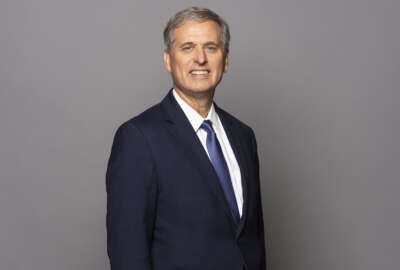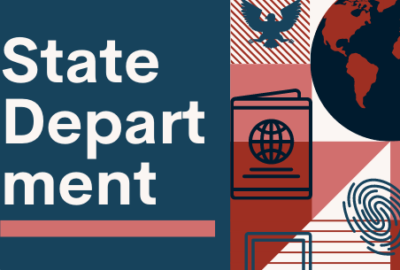

Hubbard Radio Washington DC, LLC. All rights reserved. This website is not intended for users located within the European Economic Area.
The State Department's new Bureau of Cyberspace and Digital Policy started up just about eight weeks ago.
Best listening experience is on Chrome, Firefox or Safari. Subscribe to Federal Drive’s daily audio interviews on Apple Podcasts or PodcastOne.
The State Department’s new Bureau of Cyberspace and Digital Policy started up just about eight weeks ago. For what it doing and what it’s all about, the principal deputy assistant secretary, Jennifer Bachus spoke to the Federal Drive with Tom Temin.
Interview transcript:
Tom Temin: Ms. Bachus, good to have you on.
Jennifer Bachus: Thank you for having me.
Tom Temin: Let’s begin with what this bureau is all about. What’s it supposed to do?
Jennifer Bachus: So the Cyberspace and Digital Policy Bureau is focusing on three distinct aspects of cyberspace and digital policy, which is the national security, economic opportunities and human rights elements of this field.
Tom Temin: And because it’s the State Department, you’re talking about the occurrences of these things overseas, correct?
Jennifer Bachus: Well, of course, the primary focus is on cooperating with our friends, partners and allies, leading the inner agency to come up with an externally focused policy, not a U.S. domestic focused policy. But of course, it does require coordination with other departments like the Department of Homeland Security, Department of Defense, etc.
Tom Temin: And in looking outside, beyond the United States, what are some of the goals for cybersecurity and cyberspace and digital policy? What are we trying to achieve here?
Jennifer Bachus: Well, I think what we’re trying to achieve is we’re trying to put forward a positive vision for the internet, and specifically, what we believe in is an open, reliable, secure and interoperable internet. So those are what we talk about. So this is a positive vision of what the internet is, and should be into the future. That’s our main goal.
Tom Temin: Because it’s a little complicated. I’ve read certain accounts that describe the fact that, really, the world has three internets, now. There’s the Western internet that we share with Western Europe, EU nations, I guess, to some extent, South America, but then there’s the Chinese and North Korean type of internet, and then maybe a third area of the internet, say, Russia and the Eastern Bloc, or something like that. Those are kind of old fashioned ways of looking at the world in some ways, but really, the universal internet is no longer. So is that your view? Or are you looking just to make sure that people that understand the world as the United States roughly understands it, make sure that we stay together?
Jennifer Bachus: Well, I would start by saying that, of course, there’s a lot of talk about what people termed splinternet between various parts. But at this point, we haven’t actually seen that. There are efforts by China and others to limit access to information. But the internet is universal. And people are still able to access that information. Of course, they use a variety of workarounds and other things. But I would say there is still one internet today. And the U.S. and its allies are trying to lead to ensure that people throughout the world continue to have access to information, regardless of where they’re physically located.
Tom Temin: So would this be fair analogy, that you’re almost trying to have a Radio Free Europe type of approach to the internet, such that people in Russia and China and North Korea, a lot of countries, probably 50 countries can even with workarounds to be able to access information that’s true and unbiased, and so on.
Jennifer Bachus: I would agree that is important that people around the world continue to have access. And it is a little bit like Radio Free Europe. But of course, it’s also preserving what’s existed, since the dawn of the internet, as opposed to creating something new is trying to make sure that there isn’t this fragmentation of the digital economy, nor of digitalization around the world. So this is, of course, part of it is making sure that people have access to information. It’s also trying to make sure that places that haven’t been able to benefit from the arrival of the internet can and do in a way that’s again, with this vision of an open, interoperable, secure and reliable internet. So some of it’s about preserving what exists, and then rolling out continued accessibility around the world.
Tom Temin: In that sense, then it’s a really competitive situation with China and Russia, primarily China.
Jennifer Bachus: Well, they of course, have a different vision of the internet that they are attempting to portray around the world. But we think that when you talk to people that that’s not the vision that they ultimately want, and yes, it is a competition over vision. And that’s why it’s important that we retain our leadership in this sphere, and we elevate it through the creation of this bureau.
Tom Temin: We’re speaking with Jennifer Bachus, she’s the Principal Deputy Assistant Secretary of State for the Bureau of Cyberspace and Digital Policy, again, operating just about eight weeks now. And you will not be the permanent head that because the State Department is seeking a Senate confirmed head?
Jennifer Bachus: That’s correct. There will be an ambassador at large who will be the head of the bureau.
Tom Temin: What is the experience in the meantime that you’re bringing to it?
Jennifer Bachus: Well, I’m a longtime career diplomat. I’ve been working at the State Department for 24 years now deployed all over the world, representing U.S. interests overseas, in nearly every region of the world. So what I bring is specifically this vision of what it is on our embassies need and what our embassies do overseas. The greatest resource that the State Department has is our presence around the world. So it’s great to make policy in Washington and we do that. But then you have to figure out how to deploy that policy overseas and respond to what the people working in the embassies, talking to our friends, our allies. And even the people who aren’t our friends and allies about these issues.
Tom Temin: And let’s talk about the bureau itself, often new government structures pull from existing ones, and kind of reconstitute things. Is that what happened here? What are some of the elements that came into this new bureau?
Jennifer Bachus: Yeah, so I do like to say that while the bureau is new, what we’ve been doing on these issues has been around for decades. So we took the office that was doing cybersecurity called SCCI. We took the Economic Bureau’s office that was doing the economic policy elements, we brought those in under one tent, and then we added a digital freedom unit. And that’s completely new, as well as a strategic planning and communications element so that we can be thinking a big picture thinking about the way ahead. So again, we had about 60 positions already existing, and we’re adding about 40 more. So it will be about 100 total, when the bureau is completely up and running.
Tom Temin: And is it physically located in Washington, D.C.,presuming people will be going back to the main State Building?
Jennifer Bachus: Yes, we are located in Washington, D.C., in the main State Department building.
Tom Temin: All right, and where will you get those 40 extra people that you want to bring in?
Jennifer Bachus: Well, it will be a mix, of course, it’ll be a mix of people already working in the U.S. government or working in the State Department. There’s a lot of enthusiasm around this. But of course, we’ll be looking outside the State Department and outside the U.S. government as well. We’ve been getting emails from sort of around the United States, people excited by this idea, and who wants to join us in leading on these issues.
Tom Temin: And what about the Defense Department? Are they a collaborator in this effort? Because, you know, for many years, that’s been the cry from successive Defense Secretaries, we need more from the State Department. And of course, they have the cyber warfare and cyber domain issue for defense, which maybe can be in conflict with what the State Department is trying to do. So how do you collaborate with DoD?
Jennifer Bachus: So again, over my 24 years, in the State Department, I’ve recognized the important element of collaboration across the interagency. Department of Defense is, of course, one important element of who we work with around the world. So I think some of it is about setting up the systems that maintain this good communication, whether it’s biweekly phone calls, email exchanges, we also have a political adviser who’s at the Cyber Command now, that person went a couple of weeks ago, and again, gives us a good connectivity with them. So there’s both the sort of me the working level communication, collaboration, coordination, as well as this embedded person at Cyber Command.
Tom Temin: And from what you can tell Congress has a pretty strong interest in the success of this bureau also, doesn’t it?
Jennifer Bachus: Yes, Congress had very strong views about how to set up the bureau. And we really worked very closely with them to make sure that we recognized and incorporated their point of view on how we should be leading in these issues. So that’s been great.
Tom Temin: And what will you do once that Senate confirmed Bureau head comes in?
Jennifer Bachus: Well, then I’ll go back to sort of the more traditional principal deputy assistant secretary role, which is, you know, it’s a little bit like being the chief operating officer, we say, so you make sure that the bureau is well run, you give overall guidance, you make sure that people have the things they need in order to be successful. And then, of course, so you’re advising down to the deputy assistant secretaries, the coordinators, etc. But you’re also advising up to the ambassador at large, the person themselves.
Tom Temin: And will you still get to travel around some and do a little diplo yourself?
Jennifer Bachus: Well, I hope so. But really, it’s always a very close collaboration and sort of figuring out where the value added is, and making sure as well that we have somebody in Washington manning the shop, should we say because even when you’re traveling, there’s still things like interagency meetings that you need to have the high level State Department participation in.
Tom Temin: Right. And at 24 years in State Department, you’re still relatively young. So you’ve got a lot of other things you might be able to do in the future.
Jennifer Bachus: Always possible, always possible. One never knows in the State Department where they’re going to end up. It’s what’s amazing about being a Foreign Service officer is it’s having the opportunities to to sort of see the world, assist U.S. interests overseas, support our allies, partners and friends, and you never know where you’re going to end up doing that. And I find that to be one of the great benefits of this career.
Tom Temin: Jennifer Bachus is the Principal Deputy Assistant Secretary of State for the Bureau of Cyberspace and Digital Policy. Thanks so much for joining me.
Jennifer Bachus: Thank you. I appreciate it.
Copyright © 2024 Federal News Network. All rights reserved. This website is not intended for users located within the European Economic Area.
Tom Temin is host of the Federal Drive and has been providing insight on federal technology and management issues for more than 30 years.
Follow @tteminWFED


